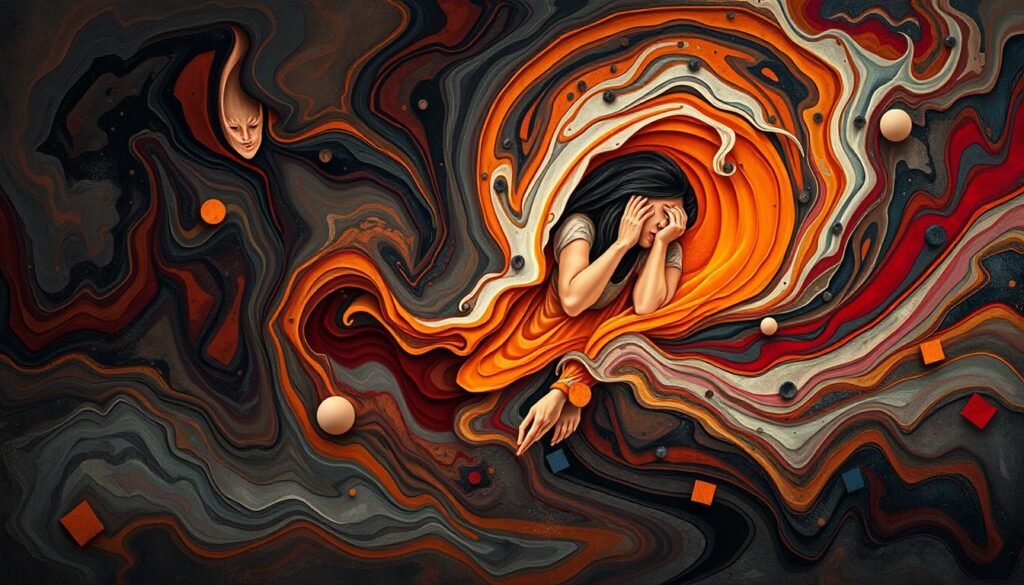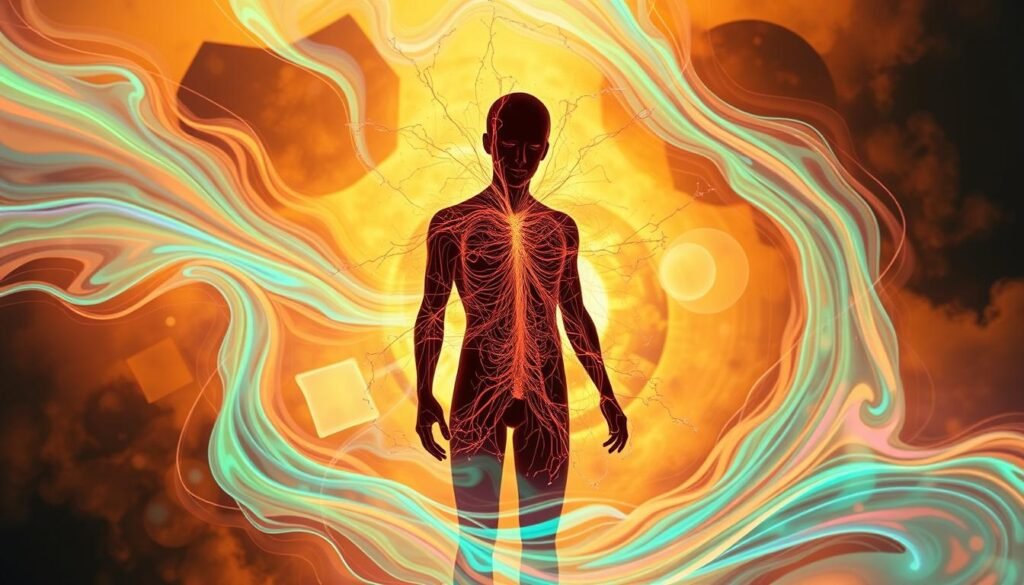Almost 40 million adults in the United States suffer from anxiety disorders. Many share symptoms similar to heart attacks. This fact is crucial but often ignored. It highlights the common symptoms of anxiety that mimic heart attack symptoms. These can lead to wrong conclusions about one’s health. Many people face anxiety episodes that bring on chest pains or difficulty breathing. They wrongly think these are signs of heart problems.
Knowing these anxiety symptoms is key to correct diagnosis and handling. Anxiety comes in many forms. Sometimes, people don’t know their symptoms are from anxiety, not heart issues. It’s vital to spread knowledge about this link. This helps people know the difference between anxiety symptoms and real heart attack signs. For more details, see this article from Johns Hopkins Medicine.
Key Takeaways
- Anxiety disorders affect nearly 40 million adults in the U.S.
- Common symptoms of anxiety include chest pain, shortness of breath, and rapid heartbeat.
- Knowing the difference between anxiety symptoms and heart attack signs is important for managing health.
- Women are more affected by anxiety disorders, which influences their heart health.
- Getting professional help is crucial for dealing with anxiety effectively.
Understanding Anxiety and Its Effects on the Body
Anxiety is common and can feel like fear or worry that doesn’t quit. It can make everyday tasks hard, as fears about what could go wrong take over. This makes it tough to enjoy life. The body also responds physically to these stressors. It activates a “fight or flight” response when we’re anxious.
When anxiety hits, our body pumps out stress hormones like adrenaline and cortisol. These hormones get us ready to act fast. However, this can lead to physical signs of anxiety. Some of these signs are:
- Increased heart rate
- Muscle tension
- Changes in breathing patterns
- Elevated blood pressure
Knowing these signs helps us understand our anxiety better. It lets us know the issues are not related to our heart but to our stress. Learning how our body deals with stress is key. It helps us manage our mental health better and find good ways to cope.
Understanding both the mind and body aspects of anxiety is empowering. This knowledge leads to better coping skills. It improves our well-being overall.
Common Symptoms of Anxiety that Mimic Heart Attack
Anxiety can show up in many ways that look like heart attack symptoms. People having an anxiety attack might feel similar to those having a heart attack. It’s key to know these similar signs to manage anxiety well.
Chest pain is a common sign of anxiety that can be worrisome. This pain might feel sharp or dull, which can confuse people into thinking it’s heart-related. Anxiety can also make you feel short of breath. This can scare someone into thinking they can’t breathe right. Remember, these feelings can make anxiety worse, creating a hard cycle to break.
Heart palpitations are another big sign of anxiety. Your heart might race, skip a beat, or beat too hard. These can be mistaken for heart attack signs. Knowing these are from anxiety can help calm you down. It brings attention to taking care of your health.
Learning about these signs can help you take charge of your mental health. Knowing about how your body reacts to anxiety can make it easier to tell it apart from real heart issues. Dealing with these signs calmly can lessen fear and help your well-being.
| Symptom | Anxiety Reaction | Heart Attack Reaction |
|---|---|---|
| Chest Pain | Dull or sharp discomfort | Severe, persistent pain |
| Shortness of Breath | Feeling of choking or tightness | Difficulty breathing, accompanied by other symptoms |
| Palpitations | Heart racing or fluttering | Rapid or irregular heartbeats |
Knowing and understanding how anxiety shows up is crucial. It helps reduce worry over potential heart issues. With better knowledge and awareness, people can manage their health challenges more effectively.
Chest Pain: Recognizing the Difference
Chest pain often makes us worry about our health. It’s key to know the various chest pain types. This knowledge helps tell apart anxiety chest pain from heart condition signs. Anxiety can cause chest feelings that confuse us. Learning to identify these can help in managing them wisely.
Types of Chest Pain Associated with Anxiety
Anxiety chest pain is different from heart attack signs. It may feel sharp and quick, not like the deep pain of heart problems. Anxiety-related chest pains include:
- Sharp pain: This is a quick, stabbing pain that doesn’t last long.
- Muscle tension: This discomfort feels similar to heart trouble.
- Hyperventilation: Rapid breathing causes chest tightness, adding to the panic.
These feelings can mix up with real heart issues. That’s why knowing and understanding them is vital.
When to Seek Medical Help
It’s critical to know when chest pain is serious. Persistent or really bad chest pain needs a doctor’s check right away. Key symptoms that need quick action are:
- Persistent pain: Pain that stays for more than a few minutes.
- Pressure or squeezing: Feeling like something heavy is on your chest.
- Additional symptoms: If you also can’t breathe well, sweat a lot, or feel sick.
Being safe rather than sorry is best. Knowing these precautions helps decide when to get help. It prevents confusing anxiety chest pain with real heart troubles. For details on spotting the difference between panic attacks and heart attacks, visit this helpful link.
Shortness of Breath: A Frequent Anxiety Symptom
Many feel shortness of breath when they are anxious. This happens during stressful times. People breathe fast and shallow. Knowing why this happens can help us feel better.
Mechanisms Behind Shortness of Breath
Anxiety makes our body release adrenaline for fight or flight. This causes several changes:
- Increased heart rate
- Heightened sensitivity in the respiratory system
- Shallow breathing due to muscle tension
These changes lead to feeling short of breath. This is often thought to be something worse.
Comparison with Heart-Related Issues
It’s important to tell anxiety breathlessness apart from heart issues. Heart attack signs include severe chest pain with breathlessness. Anxiety is more about episodes that get better after the stress goes away.
Knowing the differences helps us seek the right help without panicking. Below is a table showing both conditions:
| Feature | Anxiety Symptoms | Heart Attack Signs |
|---|---|---|
| Onset | Sudden and situational | Gradual or sudden |
| Duration | Short, often resolves with calming | Can persist longer than 15 minutes |
| Accompanying Symptoms | Feelings of panic, rapid heartbeat | Nausea, sweating, dizziness |
| Response to Activity | May worsen with physical exertion | Worsens with minimal exertion |
Palpitations: Heart Racing from Anxiety
Palpitations feel like your heartbeat is racing or skipping. This often happens when you’re anxious. Knowing how your body reacts to stress helps understand why. When stressed, our bodies release adrenaline. This makes the heart more sensitive. So, someone feeling anxious may notice their heart racing.
What Causes Palpitations During Anxiety?
Anxiety causes palpitations because of the body’s fight-or-flight response. This makes your heart beat faster to prepare for danger. This fast heartbeat can feel like palpitations. Things like caffeine, not enough sleep, and some medications can also start these sensations. This makes finding the actual cause hard.
If you start having new or strong palpitations, see a doctor. This is especially true if you have heart problems. Some symptoms could mean something serious. Getting checked out can help avoid bigger problems. It can improve your mental and physical health.
How to Calm a Racing Heart
To calm down anxiety and palpitations, there are several things you can do:
- Deep Breathing: Taking slow, deep breaths helps control your heart rate and lower anxiety.
- Mindfulness Exercises: Mindfulness or meditation helps shift your focus away from anxious thoughts, which relaxes you.
- Regular Exercise: Being active is good for your mental health and helps lower anxiety.
- Hydration: Drinking enough water is important for your heart to work well.
These methods can help lessen panic. For more tips on dealing with palpitations, visit this link.
Dizziness: When Anxiety Strikes
Dizziness is a common symptom for people with anxiety. It can make you feel off-balance and light-headed. This problem often comes from breathing too fast and tense muscles. Knowing the difference between dizziness from anxiety and heart problems is key.
The Impact of Anxiety on Balance
Anxiety can really mess with your balance. This is because it puts your body on high alert. This reaction can cause:
- Increased heart rate
- Shallow breathing
- Muscle tension
These changes affect your vestibular system, which controls balance. That’s why you might feel dizzy. This can make you even more anxious or panicked.
Distinguishing Between Dizziness and Heart Problems
It’s important to tell the difference between dizziness from anxiety and signs of heart issues. Although anxiety often causes dizziness, serious health problems might show similar signs. Keep an eye on other symptoms like:
| Symptom | Anxiety-Related | Possible Heart Condition |
|---|---|---|
| Dizziness | Common in anxiety, often linked to tension and hyperventilation | May occur with heart palpitations or chest pain |
| Shortness of Breath | Typically due to anxiety-induced hyperventilation | Can indicate heart conditions, especially when experienced suddenly |
| Chest Pain | Related to muscle tension during anxiety episodes | Should be evaluated for potential heart issues, especially if severe |
Knowing these differences helps people take the right steps towards treatment. It ensures they get the care they need.

Sweating: A Physical Response to Anxiety
Sweating is a clear sign of anxiety, showing how our bodies react to stress. It can range from mild to intense, depending on the situation. Recognizing this can help us understand our anxiety better.
Types of Sweating Related to Anxiety
Different types of sweating can point to anxiety. Each type has its own set of symptoms. Here’s a detailed table that explains these differences:
| Type of Sweating | Description | When It Occurs |
|---|---|---|
| Normal Sweating | Body’s natural cooling mechanism. | During physical exertion or hot environments. |
| Anxious Sweating | Clammy, excessive sweating without physical activity. | During anxiety-inducing events or panic attacks. |
| Cold Sweating | Profuse sweating, often accompanied by chills. | Extreme anxiety or approaching panic situations. |
| Localized Sweating | Sweating concentrated in certain areas (e.g., palms, feet) | Specific triggers or social anxiety scenarios. |
Understanding Nausea as an Anxiety Symptom
Nausea is a common sign of anxiety that impacts many people under stress. The body reacts to anxiety in different ways, making you feel sick. Knowing these signs are from anxiety is key to handling them right.
How Anxiety Triggers Nausea
Anxiety causes nausea by releasing stress hormones, messing up digestion. This reaction can also come from a faster heart rate and changed breathing, seen in anxious moments. People often feel nauseous as their anxiety gets stronger.
When Nausea Signals a Heart Issue
Sometimes, nausea warns us of possible heart problems. It’s important to know when nausea isn’t just from anxiety but might point to something more serious. If nausea comes with chest pain, breathing trouble, or sudden tiredness, get medical help fast. This knowledge helps tell the difference between normal anxiety signs and possible heart issues.

Fatigue: Anxiety and Chronic Tiredness
Fatigue is a big, often misunderstood sign of anxiety. Anxiety keeps us on high alert, which can make us very tired. People with anxiety find they’re constantly tired, affecting their day-to-day life and well-being. Knowing why anxiety makes us tired is the first step in dealing with it.
Why Anxiety Causes Physical Exhaustion
Anxiety puts our bodies on high alert, releasing adrenaline and cortisol. This makes us feel drained. The effort to manage stress day in, day out leads to significant fatigue.
Anxiety’s impact isn’t just feeling tired. It affects our physical health in many ways. People with anxiety often have:
- Persistent sleep problems leading to tiredness
- Less focus, making daily tasks harder
- Physical issues like tense muscles and headaches
Understanding the connection between anxiety and tiredness can lead to better coping methods. Making small changes in our lifestyle can greatly help with anxiety-related fatigue. Here are some useful strategies:
| Strategy | Description |
|---|---|
| Regular Exercise | Exercise can help you sleep better and boost your energy. |
| Meditation and Mindfulness | These techniques can lessen stress and make you feel happier. |
| Proper Nutrition | Eating well gives your body the fuel it needs for more energy. |
| Sleep Hygiene | A regular sleep schedule improves how well you sleep. |
Tingling Sensations: Anxiety’s Neurological Response
Tingling sensations are common during anxiety episodes. They can occur in different body parts because of how anxiety impacts the nervous system. The fight-or-flight response triggers stress hormones. This leads to tingling as muscles tense and blood flow changes. Knowing about these responses helps in managing anxiety.
Identifying Tingling as a Symptom
It’s important to see tingling as a sign of anxiety. Although alarming, these sensations are not harmful. They are stress responses. Commonly, the hands, feet, and face are affected. Being aware helps to not confuse them with other health issues.
How to Deal with Tingling Sensations
There are ways to reduce tingling sensations caused by anxiety. Deep breathing exercises and meditation help calm the nerves. Focusing on physical sensations or surroundings provides quick relief. Staying active, drinking water, and eating well also help in easing anxiety symptoms.

| Technique | Description | Benefits |
|---|---|---|
| Deep Breathing | Slow, deep breaths to relax the body | Reduces stress and calms tingling sensations |
| Meditation | Mindful focus to ground oneself | Improves awareness and reduces anxiety symptoms |
| Physical Activity | Regular exercise to boost health | Enhances mood and decreases overall anxiety |
| Hydration | Staying adequately hydrated | Supports bodily functions and alleviates symptoms |
| Balanced Diet | Nourishing the body with nutrient-rich foods | Promotes overall well-being and supports anxiety management |
Understanding the link between physical sensations and anxiety is key for emotional health. Realizing that tingling is usually harmless aids in self-care. For more info on anxiety symptoms, check out this article.
Managing Anxiety Symptoms to Distinguish from Heart Issues
Understanding how to manage anxiety is key to telling it apart from heart problems. With the right approaches, you can better understand your body’s signals. This knowledge allows you to handle anxiety confidently.
Tips for Self-Management
Adding daily habits can help you manage your anxiety. These tips make it easier to tell the difference between anxiety and heart problems:
- Mindfulness Meditation: Staying present through mindfulness can lower anxiety.
- Breathing Exercises: Simple deep breathing can calm anxiety quickly.
- Regular Physical Activity: Consistent exercise improves mental health and relaxes you.
- Balanced Diet: A healthy diet boosts well-being and helps ease anxiety symptoms.
- Sleep Hygiene: Good sleep is key for emotional control and stress management.
Seeking Professional Guidance
If managing anxiety by yourself is hard, getting professional help is vital. Health or mental health professionals offer custom support. They analyze symptoms, assess, and create strategies for managing your anxiety. This active step helps manage distress and distinguish between anxiety and heart symptoms more clearly.
Conclusion
We’ve learned that anxiety can feel a lot like heart attacks. It’s crucial to know the difference. This knowledge lets people manage their health without being scared for no reason. When folks recognize signs of anxiety, like short breaths or heart racing, they can handle it better.
Educating ourselves about these issues is very important. It helps reduce worry about heart problems and improves mental health. Support from professionals or community groups is key to dealing with these challenges. Stress affects our minds and bodies, so it’s vital to address anxiety symptoms early.
Living a balanced life means paying attention to both mental and physical health. Making mental well-being a priority can lead to a happier, healthier life. By learning and applying the right coping strategies, people can greatly enhance their life quality.